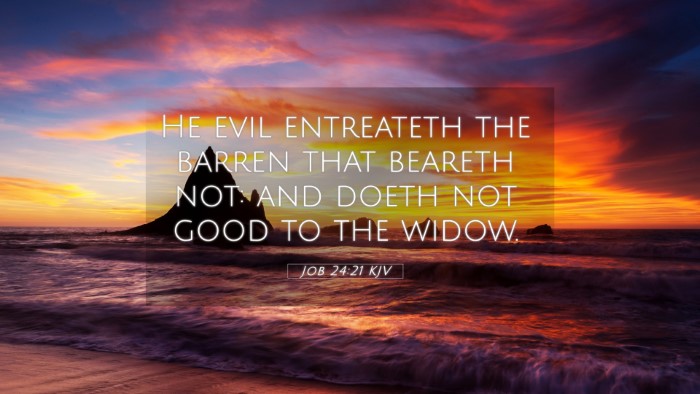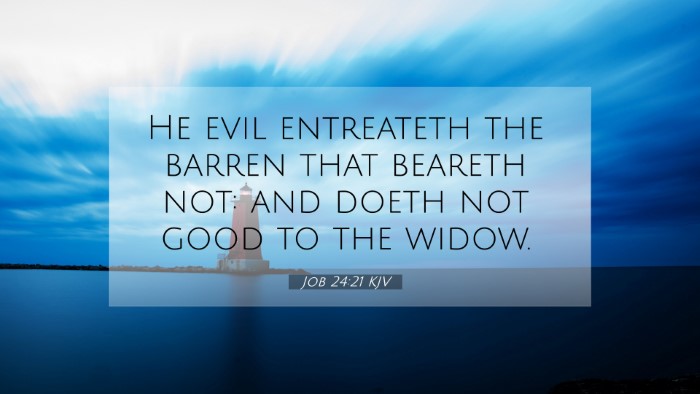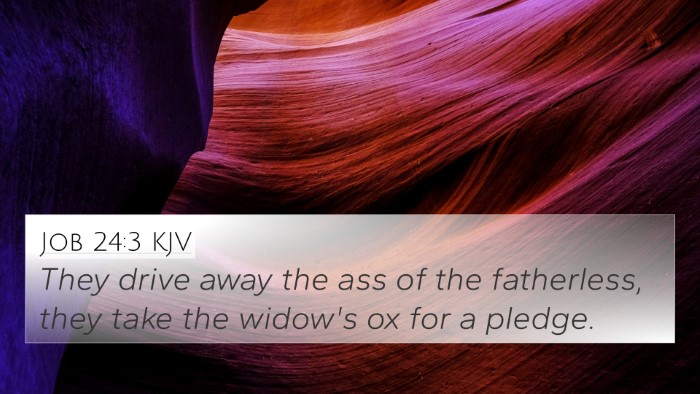Old Testament
Genesis Exodus Leviticus Numbers Deuteronomy Joshua Judges Ruth 1 Samuel 2 Samuel 1 Kings 2 Kings 1 Chronicles 2 Chronicles Ezra Nehemiah Esther Job Psalms Proverbs Ecclesiastes Song of Solomon Isaiah Jeremiah Lamentations Ezekiel Daniel Hosea Joel Amos Obadiah Jonah Micah Nahum Habakkuk Zephaniah Haggai Zechariah MalachiJob 24:21 Similar Verses
Job 24:21 Cross References
He evil entreateth the barren that beareth not: and doeth not good to the widow.
Uncover the Rich Themes and Topics of This Bible Verse
Listed below are the Bible themes associated with Job 24:21. We invite you to explore each theme to gain deeper insights into the Scriptures.
Job 24:21 Cross Reference Verses
This section features a detailed cross-reference designed to enrich your understanding of the Scriptures. Below, you will find carefully selected verses that echo the themes and teachings related to Job 24:21 KJV. Click on any image to explore detailed analyses of related Bible verses and uncover deeper theological insights.
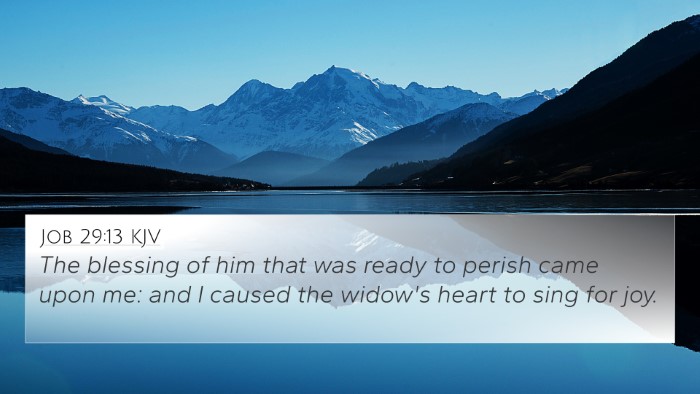
Job 29:13 (KJV) »
The blessing of him that was ready to perish came upon me: and I caused the widow's heart to sing for joy.
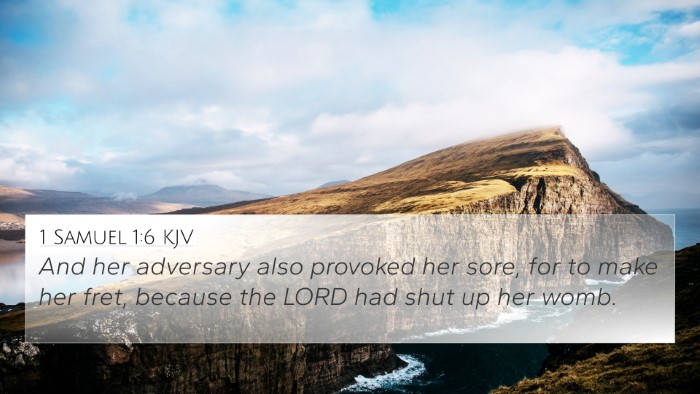
1 Samuel 1:6 (KJV) »
And her adversary also provoked her sore, for to make her fret, because the LORD had shut up her womb.
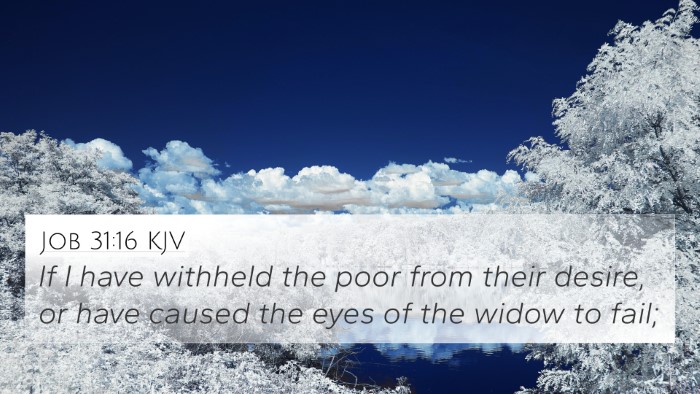
Job 31:16 (KJV) »
If I have withheld the poor from their desire, or have caused the eyes of the widow to fail;
Job 24:21 Verse Analysis and Similar Verses
Meaning and Interpretation of Job 24:21
Job 24:21: "He devoureth the barren that beareth not, and doeth not good to the widow."
This verse from the Book of Job speaks to the themes of injustice and the plight of the vulnerable. Job is reflecting on the wickedness of those who exploit the powerless, particularly the barren and the widows, who represent the most defenseless members of society. This exploration of morality and divine justice is a recurring theme throughout Job's discourse.
Commentary Insights
The perspectives from prominent public domain commentators provide a multifaceted understanding of this verse:
-
Matthew Henry's Commentary:
Henry emphasizes the cruel nature of individuals who, instead of showing compassion, prey on the weak. He highlights that the "barren" and "widow" are metaphorical representations of those who are incapable of defending themselves. He suggests that such behavior is not only morally reprehensible but invites divine judgment.
-
Albert Barnes' Notes on the Bible:
Barnes focuses on the social implications of the verse. He points out that the "barren" illustrates those without the means to prosper and that oppressing such individuals reveals the depravity of the oppressors. He insists that this behavior contradicts the expected virtues of charity and justice outlined in the Scriptures.
-
Adam Clarke's Commentary:
Clarke elaborates on the moral darkness present in society where the helpless are exploited. He underscores the need for righteous judgment and advocates for a society where the needs of the widow and the barren are acknowledged and cared for, emphasizing God's concern for the marginalized.
Thematic Connections and Cross-References
Job 24:21 resonates with various themes found throughout the Bible and is interconnected with several other verses:
- Psalms 146:9: "The Lord watches over the foreigner and sustains the fatherless and the widow, but he frustrates the ways of the wicked."
- Isaiah 10:1-2: "Woe to those who make unjust laws, to those who issue oppressive decrees, to deprive the poor of their rights and withhold justice from the oppressed of my people."
- Proverbs 14:31: "Whoever oppresses the poor shows contempt for their Maker, but whoever is kind to the needy honors God."
- Zechariah 7:10: "Do not oppress the widow or the fatherless, the foreigner or the poor. Do not plot evil against each other."
- Matthew 23:14: "Woe to you, teachers of the law and Pharisees, you hypocrites! You devour widows' houses and for a show make lengthy prayers. Therefore, you will be punished more severely."
- James 1:27: "Religion that God our Father accepts as pure and faultless is this: to look after orphans and widows in their distress..."
- Lamentations 3:34-35: "The Lord does not overlook the injustices in the land, nor does He stretch the laws to favor those who oppress."
Understanding Through Comparative Bible Verse Analysis
This verse holds significance within a broader inter-Biblical dialogue and provides a compelling study of contrasting themes between the righteous and the wicked:
- Comparison with Proverbs: In the Book of Proverbs, verses often emphasize the importance of justice and caring for the vulnerable, aligning with Job's lament regarding the wicked's behavior.
- Links with New Testament Teachings: Jesus’ teachings on the treatment of the marginalized reflect similar concerns expressed by Job, particularly in teachings about caring for the least among us (Matthew 25:40).
- Exploration of Hebrew Poetic Structure: Analyzing the structure of Job's poetry reveals how this verse encapsulates profound truths about humanity and divine justice.
- Psalms Reflection: The Psalms often echo similar themes, offering prayers and laments for justice, reflecting Job's conditions and concerns.
- Application in Sermon Preparation: This verse serves as a critical reference point for sermons centered on social justice and moral responsibility within Christian teachings.
Tools and Resources for Bible Cross-Referencing
Using tools for Bible cross-referencing can enrich understanding of verses like Job 24:21:
- Bible Concordance: Use a concordance to find specific keywords related to this verse that guide readers to similar themes.
- Bible Cross-Reference Guide: Utilize guides that help in discovering thematic connections between verses throughout the Scriptures.
- Cross-Reference Bible Study Tools: Engage with study tools that allow for deeper exploration of how verses relate, enhancing comprehension.
Conclusion
Job 24:21 serves as a poignant reminder of God’s justice and the moral obligations humans have toward one another. The collective insights from Matthew Henry, Albert Barnes, and Adam Clarke, combined with meaningful cross-references, enrich our understanding of the complexities surrounding the themes of justice, oppression, and divine oversight. By leveraging tools for cross-referencing and noting the connections between various biblical texts, readers can cultivate a deeper understanding of God's word and its implications for how we treat the marginalized in society.

